Brookhurst Seafood Bar serves goodness in a bag. Literally. Customers sit down, fasten plastic bibs around their necks, slip on gloves and proceed to rip apart shrimp and lobster swimming in a herb and garlic sauce inside a plastic bag. The goodness doesn’t stop there. Scallops, shrimp and mussels are strewn all over the restaurant’s paper-covered tables. Diners pick and poke at them, chuckling, commiserating and taking selfies with their iPhones which are protected by complimentary zip lock bags.
The owner of the restaurant, Taiwanese-American Wendy Wu (吳欣穎), came up with the concept she calls “grub and chug,” on a trip to Los Angeles last year when she dined at The Boiling Crab, a joint serving seafood in a similar fashion. She wanted the food at Brookhurst to be served with less butter though, and thought it would be helpful to provide gloves and cellphone bags so that diners could still go through their usual routine of uploading food pictures to Facebook and Instagram.
“Today’s generation is phone savvy,” Wu tells the Taipei Times.
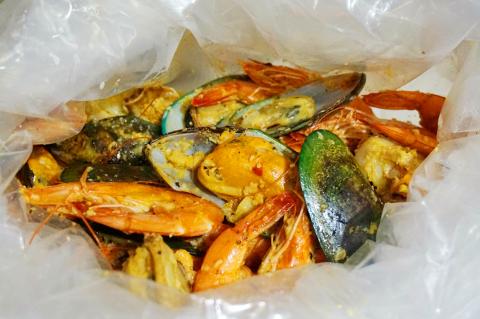
Photo: Dana Ter, Taipei Times
Spending the last decade shuttling back and forth between Taipei and Los Angeles, Wu’s career has spanned from being a radio DJ for ICRT to working retail for fashion brands and singing and performing on stage. Her entire right arm is inked (her husband is a tattoo artist/hipster-vintage store owner) and she has an infectious personality.
Once they had their concept, Wu and the restaurant’s other two partners, Lareine Ko (徐瑞蓮) and Johnny Fei (費聿鋒) spent two months perfecting their “secret sauce” in Wu’s kitchen. For months, her house reeked of herbs, garlic and butter.
“I would wake up in the morning sweating the sauce,” Wu says.
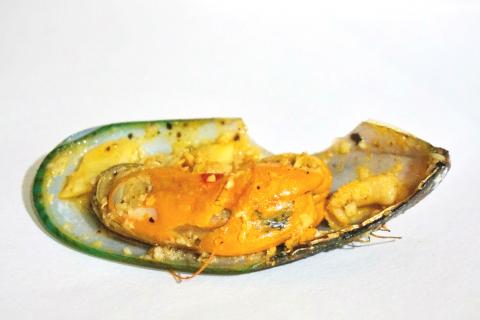
Photo: Dana Ter, Taipei Times
Their efforts paid off because the restaurant, which opened in February, was packed on a Tuesday night when a friend and I dined there. The most popular pick is, of course, the seafood bag, otherwise known as their “BS Combo” where customers choose from an assortment of clams, mussels, white shrimp and Hokkaido scallops. Sauce-wise, the lemon zing is recommended for those with lighter palates, while the Brookhurst bang and Cajun sauces are better suited for those who can take the garlic. The spiciness of the sauce can also be adjusted. The smallest combo, the shrimp and shells (NT$999) feeds two people, while the largest combo, the big catch (NT$5,990), which comes with king crab legs, Boston lobster and a selection of shrimp, is suitable for large groups. There is a generous selection of add-ons on the menu, including veggies and meat. The German and smoked sausages (NT$80), which I had, is a fine choice. However, the meal isn’t complete without something to slop up the sauce with. For that, I ordered slices of French baguette (NT$30).
While many restaurants are judged by their presentation — after all, it’s an important element in the overall dining experience — presentation is least paramount at Brookhurst. Being able to dig into your food with your hands and laying it out on the table without plates has its benefits. For starters, it’s easier to see and feel what you’re eating. Not only that, the entire concept of “grub and chug” taps into our innate childlike propensity to have fun and create a mess.
The mussels, Hokkaido scallops and white shrimp complemented each other well. The mussels were cooked in such a way that they were soft, warm and chewy without a discernible tinge of the rubbery. Lightly seared on the outside, the Hokkaido scallops were warm and mildly cod-like on the inside. By contrast, the white shrimp had a robust natural sweetness and subtle buttery texture which paired well with the more neutral flavors of the mussels and scallops. The German and smoked sausages were a fine addition to the seafood bag, adding a juicy, tender dimension.
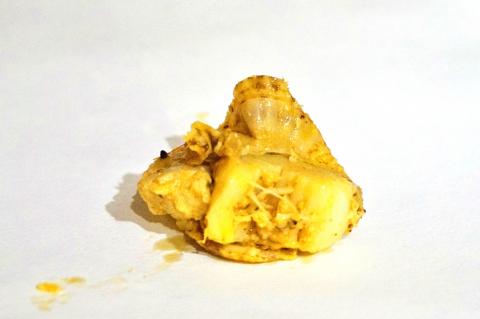
Photo: Dana Ter, Taipei Times
What pulls it all together, however, is the sauce. Neither too thick nor too watery, the Brookhurst bang was a delightful blend of spices, herbs, garlic and butter. There were hints of paprika, pepper and ginger, making it bold and flavorful. I chose my sauce to be mildly spicy, and that gave it just enough zing without having to compete with the freshness of the seafood. The best way for savoring the sauce was dipping my baguette in it and wiping it clean.
Although Brookhurst might be a no frills seafood bar, it is up there when it comes to thrills. Along with clam shells, proper restaurant etiquette is thrown out the window as hungry diners pick their way through seafood bags. While not exactly the best date night spot, in theory, Brookhurst provides a well-suited venue for catching up with friends and being sloppy without being judged.
“I know it’s cliched to say that food brings people together, but it does,” Wu says.
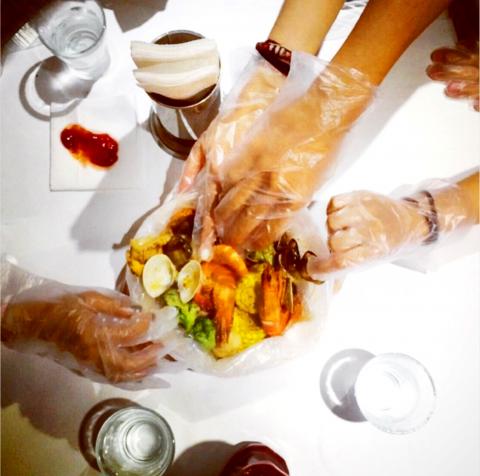
Photo courtesy of Brookhurst Seafood Bar
She adds that she hopes that the restaurant can help bring friends who have drifted apart — because of marriage, babies or whatever reason — back together, bringing a human touch back to the dining experience.
Sure, I thought as I caught a side-glimpse of the two immaculate girls next to me pausing to take selfies with crab claws every 10 seconds.
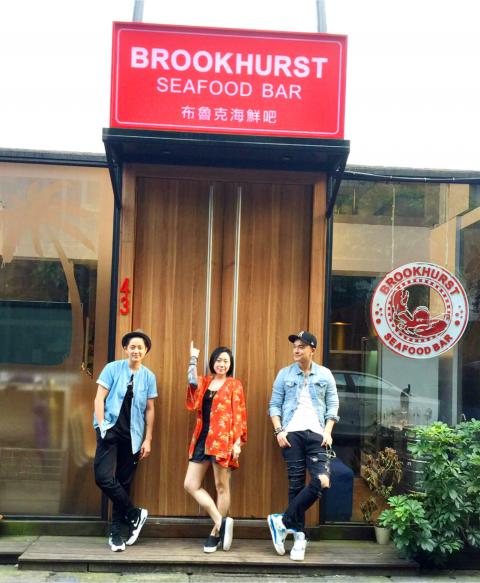
Photo courtesy of Brookhurst Seafood Bar

April 14 to April 20 In March 1947, Sising Katadrepan urged the government to drop the “high mountain people” (高山族) designation for Indigenous Taiwanese and refer to them as “Taiwan people” (台灣族). He considered the term derogatory, arguing that it made them sound like animals. The Taiwan Provincial Government agreed to stop using the term, stating that Indigenous Taiwanese suffered all sorts of discrimination and oppression under the Japanese and were forced to live in the mountains as outsiders to society. Now, under the new regime, they would be seen as equals, thus they should be henceforth

Last week, the the National Immigration Agency (NIA) told the legislature that more than 10,000 naturalized Taiwanese citizens from the People’s Republic of China (PRC) risked having their citizenship revoked if they failed to provide proof that they had renounced their Chinese household registration within the next three months. Renunciation is required under the Act Governing Relations Between the People of the Taiwan Area and the Mainland Area (臺灣地區與大陸地區人民關係條例), as amended in 2004, though it was only a legal requirement after 2000. Prior to that, it had been only an administrative requirement since the Nationality Act (國籍法) was established in

Three big changes have transformed the landscape of Taiwan’s local patronage factions: Increasing Democratic Progressive Party (DPP) involvement, rising new factions and the Chinese Nationalist Party’s (KMT) significantly weakened control. GREEN FACTIONS It is said that “south of the Zhuoshui River (濁水溪), there is no blue-green divide,” meaning that from Yunlin County south there is no difference between KMT and DPP politicians. This is not always true, but there is more than a grain of truth to it. Traditionally, DPP factions are viewed as national entities, with their primary function to secure plum positions in the party and government. This is not unusual

US President Donald Trump’s bid to take back control of the Panama Canal has put his counterpart Jose Raul Mulino in a difficult position and revived fears in the Central American country that US military bases will return. After Trump vowed to reclaim the interoceanic waterway from Chinese influence, US Defense Secretary Pete Hegseth signed an agreement with the Mulino administration last week for the US to deploy troops in areas adjacent to the canal. For more than two decades, after handing over control of the strategically vital waterway to Panama in 1999 and dismantling the bases that protected it, Washington has